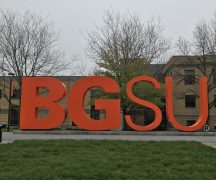By DAVID DUPONT
BG Independent News
When the announcement came out a week ago that Falcon Media was moving from the School of Media and Communication to the Office of Student Affairs, it was news to the student journalists and the faculty.
That they were taken by surprise by news so central to what they do raised doubts about how much say they will have in the future.
For the young journalists that includes worries about maintaining editorial independence.
Shaelee Haaf, editor in chief of the BG News, said “my first reaction was I was a little skeptical because the change was effective immediately on Monday” and no one had answers to their questions.
“We’re all here sitting in the dark,” she said.
Haaf tried to relay to her news staff what little she was able to glean from faculty and the leadership at Falcon Media. Still they had questions she couldn’t answer.
How would this affect the hiring process for the next academic year? How would this affect day-to-day operations? How would it affect diversity and inclusion efforts?
“I’m proud of our team for having a healthy skepticism,” she said.
“It could ultimately turn out to be a good thing. Until we know the motives behind this, we want to make sure we’re asking the right questions.”
Provost Joe Whitehead said the change was driven by the desire to position Falcon Media so it has greater exposure and have more students involved.
It comes as the university implements its Life Design initiative. The goal is to “enhance student engagement across the board.”
Whitehead also sees it as a way to strengthen engagement with the broader community, which could enhance internship and job opportunities.
In a time when the news business is in a state of flux, more emphasis will be placed on entrepreneurial opportunities.
He said while the issue has been discussed, faculty and students had not been a part of that. But he promised that close collaboration in the future.
He noted that Falcon Media, which is funded in part by student fees, had been under student affairs until the creation of the School of Media and Communication, about eight years ago.
The memo sent out on Feb. 19, placed the change as part of a broader “effort to better align and integrate academic and student affairs.”
The memo stated: “To provide for more collaboration and intentionality, we are elevating our student engagement efforts to have a more comprehensive impact. These areas, including campus activities, fraternity and sorority life, on- and off-campus student engagement and resident advisor engagement and training, will now be led by Dr. Brian Heilmeier in his new role as director of student engagement.”
Heilmeier, who will report to Jodi Webb, associate vice president for student affairs, will assume the leadership of Falcon Media, “which will transition from the School of Media and Communication in the coming months.”
Whitehead said that Falcon Media will remain “an independent voice.” Other universities across the state and nation have similar administrative arrangements, and their student media continues to be independent.
Brionna Scebbi, Falcon Media channel director, said she would welcome the prospects of having “more resources to recruit.”
Still the way the change was announced raises concerns. If the way the announcement was made is the same “as communication going forward then we’re going to have problems.”
While her conversations this week have eased her concerns somewhat, she added, “I don’t let my guard down that easy.”
Lori Liggett, a teaching professor and interim Undergraduate Program Coordinator and Internship Coordinator, said despite reassurances from the provost, she and other faculty have a lot of questions about what this will involve.
While the various components of Falcon Media, have been under different administrative umbrellas over the years, faculty have also had an integral role in them.
Unlike most other student organizations, Falcon Media is tightly interwoven with the curriculum, with students receiving credit for work at the BG News, WBGU-FM, Bowling Green Radio Sports, and BG24.
The advisors are faculty, and that’s very hands-on involvement, she said, despite the fact the issue has apparently been discussed administratively for months.
Yet they were not consulted, either as school faculty or through Faculty Senate, which has a standing committee on student media. “That’s pretty major,” she said.
Liggett also wonders about the financing. The money generated by student fees has gone to the School of Media and Communication to pay for necessary expenses, licensing, purchase of new technology and maintenance of equipment. Whether those resources will still be available, or who will be responsible for those expenses is still uncertain.
She said faculty members have been compiling a list of all the questions they need to have answered, or have been considered. “That keeps growing and growing and growing.”



